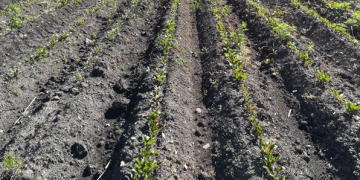Fuel Shortages Threaten Agricultural Sustainability
Bolivia’s agricultural sector is grappling with severe fuel shortages, a crisis that has disrupted production in key regions like the valleys of Santa Cruz. The reliance on mechanized farming has exposed vulnerabilities as diesel and gasoline supplies dwindle, leaving essential machinery idle during a critical planting season.
Alcides Vargas, a former departmental assembly member for Vallegrande, highlights that the scarcity of fuel has paralyzed irrigation systems and delayed planting schedules. In these highly mechanized valleys, where motobombs and tractors are indispensable, the lack of fuel has caused widespread setbacks, particularly for small and medium-scale farmers.
Rising Costs and Shrinking Margins
The fuel crisis is compounded by soaring input costs. Agricultural chemicals and veterinary supplies, which previously cost 15–18 bolivianos, now range up to 40 bolivianos. This price surge has not been matched by increased revenues for farmers or livestock producers.
A stark example is the potato crop: its production costs have risen to 30 bolivianos per unit, while market prices hover at only 20 bolivianos, resulting in substantial losses. Such imbalances are eroding the financial stability of producers and threatening the livelihoods of rural communities.
A Declining Support System
The crisis has been exacerbated by a drop in gas revenues, which has severely limited the support provided by the Santa Cruz Departmental Government. Vargas criticized the lack of political action to cut administrative expenses and reallocate resources to essential areas like agriculture, health, and education.
The lack of a robust safety net has left producers vulnerable, with minimal investment in municipal or agricultural development projects. The absence of timely interventions risks prolonged economic damage and reduced agricultural output, further straining Bolivia’s food security.
Calls for Structural Reforms
To address the crisis, Vargas has proposed a comprehensive overhaul of the Santa Cruz Departmental Government’s management structure. He advocates for fiscal reforms to ensure equitable resource distribution and prioritization of essential sectors.
“It is imperative to focus on health, education, and agricultural production while reducing bureaucratic expenditures,” Vargas stated. Such measures are vital to restoring confidence among producers and stabilizing Bolivia’s agricultural backbone.
The fuel shortage in Bolivia underscores the fragility of its agricultural sector, where external dependencies and inadequate policies have left producers struggling to maintain productivity. Without immediate action to address rising costs, supply chain disruptions, and fiscal mismanagement, the country risks long-term setbacks in food security and rural development. Structural reforms and investment in sustainable practices are urgently needed to rebuild resilience and restore growth.































